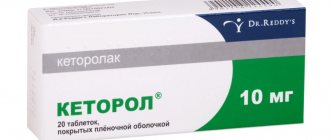Headaches and muscle pains, fever, runny nose and discomfort in the throat - these are unpleasant symptoms that you want to quickly eliminate when you have a respiratory infection. During the postpartum period, women's bodies are weakened, so it is easier to get sick, and choosing a remedy to treat and relieve fever is not so easy. Ibuprofen, used during breastfeeding, can solve these problems quickly and effectively. But can women drink it during lactation, what dose to choose so as not to harm the baby, and are there any contraindications for the medicine? Today all the questions asked will be answered.
Composition, action and release form
Ibuprofen is an antipyretic and anti-inflammatory drug, and its main component of the same name belongs to the group of NSAIDs (non-steroidal anti-inflammatory drugs). Based on the active substance, various forms of the drug are produced:
- pills;
- syrup;
- suspension;
- ointment;
- gel.
The pharmacological properties of the drug are reduced to eliminating inflammation in the body, lowering temperature, and relieving pain. The listed effects of Ibuprofen during breastfeeding are due to the inhibition of cyclooxygenase enzymes by propionic acid. These are enzymes that promote the production of prostaglandins - substances responsible for the development of swelling, pain and inflammation. They also affect the brain centers responsible for raising the temperature and controlling the thermoregulation of the body.
As a result of taking Ibuprofen in the form of tablets or syrup, the production of prostaglandins in the central and peripheral parts of the central nervous system stops, the temperature decreases, and inflammation and pain subside. The active substance also stimulates the body’s production of its own interferon, which increases resistance to infections and accelerates recovery.
Advice! The use of syrups, ointments and Ibuprofen tablets helps to quickly get rid of pain and discomfort. Ointments and gels are used externally for back pain caused by neuralgia, rheumatism and inflammation of muscle tissue. Suppositories are used rectally, accelerating the onset of the effect of the drug and reducing the risk of the substance passing into breast milk.
Pharmacological forms
Available in the form of capsule-shaped tablets with an orange film shell, on one side of the shell there is a score line. Marbling of color is acceptable. Tablets are packaged in blisters of 10 pcs., sold in cardboard boxes of 10 and 20 pcs.
Ibuklin Junior for children - soluble tablets, round in shape, scored, pink, with inclusions. They have a mint aroma.
Ibuprofen is a propionic acid derivative and belongs to the group of non-steroidal anti-inflammatory drugs. The medicine can be produced under various commercial names - “Arviprox”, “Ibuprom”, “Faspik”, “Brufen”, “Ibunorm”, “Nurofen”, “Ibuprofen synthesis”
Are they allowed for breastfeeding? This is a common question.
Ibuprofen comes in various pharmacological forms that can be used externally or internally. The substance can be the basis of gels, ointments, suppositories, suspensions, syrups, granules, capsules, tablets.
Indications for use

Ibuprofen is great for headaches
In what cases can a doctor prescribe Ibuprofen to a woman who is breastfeeding, and what symptoms can the medicine relieve? First of all, Ibuprofen is prescribed for headaches during breastfeeding. It has been proven that other drugs that can eliminate pain, for example, Aspirin, have a negative impact on the baby’s health. And taking Ibuprofen will help relieve discomfort without causing side effects in mother and child.
It is also recommended to use Ibuprofen during breastfeeding for fever caused by acute respiratory infections, ARVI, mastitis, lactostasis and other diseases that cause hyperthermia. If muscle and joint pain is noted against the background of pathologies, the drug will cope with these tasks.
Ibuprofen is used during breastfeeding to relieve toothache and discomfort caused by inflammation of the ears and paranasal sinuses. The drug can be used for painful menstruation, neuralgia associated with damage to the peripheral parts of the central nervous system, after injuries and during exacerbations of rheumatism.
Doctors prescribe Ibuprofen to nursing mothers as a safe pain reliever, but many women still worry whether taking the medication while breastfeeding is appropriate. Next, we will look at why doctors consider Ibuprofen the best remedy for relieving pain and inflammation in the body.
Negative effects of ibuprofen
The manufacturer's annotations for ibuprofen-based drugs always contain a fairly extensive list of possible negative effects of the substance. They occur quite rarely, but you need to be aware of them. If primary negative symptoms appear, a nursing woman should stop using the drug and consult a doctor about the possibility of replacing the therapeutic agent. The likelihood of negative effects increases if a woman has chronic pathologies, as well as if she violates the prescribed recommendations for using the product.
Your doctor will tell you whether ibuprofen can be taken during breastfeeding in any specific case.
The following negative manifestations may develop against the background of its use:
- Depression, anxiety.
- Bleeding in the gastrointestinal tract.
- Ulcerative lesions of the intestines and stomach.
- Flatulence, diarrhea.
- Vomiting, nausea.
- Abdominal pain.
- Arterial hypertension.
- Headache.
- Hypersensitivity, which is accompanied by redness of the dermis, itching, and urticaria.
Is it possible to use Ibuprofen during lactation?

Doctors consider Ibuprofen safe to take while breastfeeding
Headaches, fever and fever are the main symptoms of colds. During breastfeeding, is it possible to take Ibuprofen to effectively relieve the listed symptoms and not harm the baby’s health? Doctors prescribe this remedy to nursing mothers, believing that it is harmless to both the woman and the child.
The effect of many drugs in the antipyretic and analgesic series has not yet been studied, while numerous studies have been conducted on Ibuprofen. As a result, the following was established:
- the active components of the drug were found in breast milk after it was taken by a woman during breastfeeding. But in such small doses that they are not able to have a negative effect on the child’s body;
- Only 0.6-0.7% of the total amount of medication consumed by the nursing mother penetrates into breast milk;
- Taking the drug does not negatively affect lactation and does not reduce milk production by the glands.
Based on the above, Ibuprofen is the best analgesic and antipyretic medication allowed during lactation during breastfeeding. The maximum amount of active components accumulates in milk 2 hours after taking the medicine orally. Therefore, a woman should plan breastfeeding so that the peak concentration of the drug occurs between feedings of the baby.
Many mothers worry that breastfeeding their baby while the temperature rises will negatively affect his well-being. This is not true, because breast milk cannot turn sour and spoil due to hyperthermia; on the contrary, it produces antibodies that increase the baby’s immune defense. And antipyretics are prescribed to eliminate the symptoms of colds and pain in order to make a woman feel better.

Ibuprofen is an antipyretic drug
Rules for use during hepatitis B
Ibuprofen must be taken during lactation in compliance with a number of rules. First of all, the mother must visit a doctor during the breastfeeding period and obtain permission from him to use this drug. The doctor will evaluate the symptoms and decide whether it is advisable to take antipyretic and painkillers or whether the inflammation can be controlled without medication.
The official instructions for the use of Ibuprofen during lactation prescribe the following:
- a single dose of the drug is 200-400 mg;
- If necessary, tablets are taken 4-6 hours after the first one;
- the daily dosage of Ibuprofen for breastfeeding is 800 mg, while outside breastfeeding you can take up to 1200 mg of the drug;
- Take the tablets with a sufficient amount of liquid, preferably clean water;
- It is better to take the medicine after meals to reduce the negative effect on the gastric mucosa.
To reduce the risk of side effects, breastfeeding women should take an initial dose of 200 mg of Ibuprofen. If this helps eliminate pain and inflammation, and the effect is not lost after 8-10 hours, it is not necessary to take a second dose of the drug, or take the same amount of medicine, but no more. For mothers who breastfeed, tablets and suppositories are considered ideal forms of the drug. The effect of suppositories on the mucous tissue is less, so the epithelium is not irritated, and the effect occurs faster than when taking tablets orally.
Many women take Ibuprofen syrup in infant dosage, believing that this way they can be treated safely and continue breastfeeding. The concentration of the substance in the syrup is so low that it will not help an adult eliminate the symptoms of inflammation, but it contains flavoring additives and aromas that can provoke allergies.
Attention! Doctors recommend continuing self-therapy for inflammation with Ibuprofen for no more than three days. If during this time the symptoms do not subside, you should not continue self-medication, it is better to consult a specialist. If it is necessary to use an NSAID drug for a longer period of time, a break from breastfeeding may be required.
Ibuprofen is the drug of first choice for pain relief
Ibuprofen belongs to the group of non-steroidal anti-inflammatory drugs (NSAIDs). It is on the list of essential medicines of the World Health Organization (WHO), as well as on the list of vital medicines of the Russian Federation. For over thirty years, Ibuprofen has been available without a prescription in many countries in Europe and North America. The results of numerous studies confirm that the analgesic dose of the drug (1200 mg/day) is as safe as placebo.
Many effective medications in everyday life are prohibited during breastfeeding. This is due to the fact that the components of the drugs pass into breast milk, and with it into the baby’s body. This often negatively affects the health and development of the baby. The instructions for Ibuprofen basically say that it is contraindicated during lactation. This is explained by the fact that it is produced by a large number of manufacturers who do not conduct expensive additional research.
The active ingredient of the drug is ibuprofen, which, according to WHO recommendations, is compatible with breastfeeding in over-the-counter doses. Also, the European electronic directory of Spanish pediatricians allows the use of ibuprofen during lactation. The American Academy of Pediatricians thinks similarly.
Therapeutic effect, indications for use
A special feature of Ibuprofen is that the drug, in addition to its analgesic and antipyretic effects, also eliminates inflammatory processes. It belongs to the group of “short-lived” NSAIDs. The effect of taking Ibuprofen begins to be felt within fifteen to twenty minutes. Maximum effect is achieved after 1–2 hours. The half-life is 2–2.5 hours. A single dose of 400 mg of Ibuprofen provides a lasting effect of up to eight hours.

Ibuprofen is effective for inflammation and pain
For nursing mothers, the drug is prescribed for the following diseases:
- inflammatory and degenerative diseases of the spine and joints: injuries after pregnancy and childbirth, arthrosis, various arthritis, damage to the ligamentous apparatus;
- postpartum pain in soft tissues, which are accompanied by inflammation;
- migraine, sore throat due to infectious and colds;
- feverish conditions;
- bronchitis, pneumonia;
- neuralgic pain;
- toothache.
Ibuprofen is mainly used in complex treatment when pain relief alone is not enough. For example, the appearance of dental and joint pain is often associated with a deficiency of calcium and phosphorus in the diet of a nursing mother. In this case, treatment with Ibuprofen is combined with the use of multivitamin supplements. To select complex therapy, you should consult a doctor.
Side effects

Side effects may occur if the drug is taken incorrectly
Improper use of Ibuprofen during lactation contributes to the development of the following side effects:
- nausea and vomiting;
- dysfunction of the liver and renal system;
- dry mouth, damage to gum tissue;
- lack of appetite, epigastric pain;
- digestive disorders - constipation, bloating, flatulence, diarrhea;
- internal bleeding of the gastrointestinal tract.
In order not to provoke adverse reactions in the body, the mother must follow the instructions for use while breastfeeding, do not exceed doses and first obtain a doctor’s permission to take the medicine.
Contraindications
Despite the safety and effectiveness of Ibuprofen, caution should be exercised when using it while breastfeeding. Violation of the specified dosages or the presence of chronic diseases in the body can provoke an unexpected reaction from the body. It is not recommended to use the drug for the following health problems:
- ulcerative and erosive lesions of the gastric and intestinal mucosa;
- poor blood clotting;
- gastric and intestinal bleeding, as well as inflammation of these organs in the acute stage;
- diseases of the cardiovascular system;
- renal and liver failure;
- third trimester of pregnancy.
Also, you should not take Ibuprofen if you are sensitive to the active substance of the drug or if you are allergic to all drugs from the group of anti-inflammatory non-steroids. It is dangerous to combine the drug with acetylsalicylic acid and other NSAID medications. Caution is also required in case of simultaneous use of Ibuprofen with anticoagulants.

During breastfeeding, there may be various contraindications to taking medications.
Analogues of Ibuprofen for breastfeeding
How can I replace Ibuprofen if for some reason it is impossible to take the drug while breastfeeding? An analogue of the drug is Paracetamol - it is also approved for breastfeeding women, it effectively relieves pain, fever and inflammation of various origins. Another substitute for Ibuprofen is Nurofen; the active substance ibuprofen passes into breast milk in small doses and is not capable of harming the baby’s health.
On a note! If we talk about non-medicinal substitutes for the drug, then tea with raspberries, honey or currants, and herbal preparations with anti-inflammatory effects will help reduce the temperature and eliminate pain for a woman during breastfeeding. You can wipe your body with warm water with a small amount of table vinegar added, or apply a cool compress to your forehead.
Ibuprofen is an affordable and common remedy that copes well with the symptoms of inflammation, heat and discomfort. It is used for pain of various origins, during viral infections and neuralgic back diseases. Despite the simplicity of the composition and permission to use the product while breastfeeding, before taking the tablets, a nursing mother should study the instructions and consult with her doctor. This is the only way to prevent the negative impact of the medication on the baby’s health and quickly improve your well-being.











